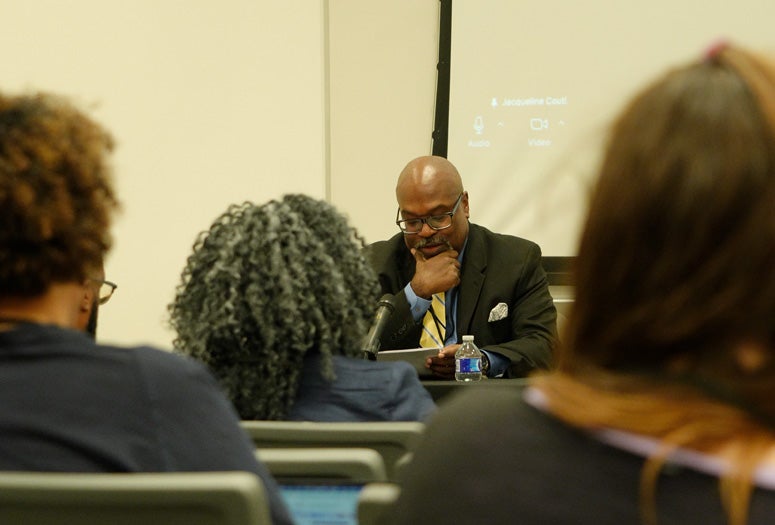Exploring Haiti’s colonial past, its revolution and independence and its contemporary challenges, the symposium “Haiti and the World: Global Encounters of the Past, Present and Future” addressed themes such as migration, political resilience, economic struggles and environmental concerns. Through two days of panel discussions, roundtables and presentations at Rice University, more than 100 participants sought to dismantle stereotypes and celebrate Haiti’s global impact — both in person and virtually.

“Haiti has a particular colonial history and trajectory, and that has impacted the way not only Haitian people see themselves but the way other people see Haiti,” said Jacqueline Couti, Rice’s Laurence H. Favrot Professor of French Studies and chair of the Department of Modern and Classical Literatures and Cultures (MCLC). “Haiti and its people have faced a long history of attack and misrepresentation due to their unique social, historical and economic trajectory.”
Organized by Couti and Linsey Sainte-Claire, assistant professor in MCLC, the event featured a diverse array of panels. “From Chains to Change: The Legacy of Colonialism and the Haitian Revolution” dug into Haiti’s revolutionary history and its global implications, while “Haitian Art and Activism as a Creative Force Beyond Borders” examined how art, literature and activism serve as powerful tools in addressing contemporary challenges.
Rice leaders played a key role in the symposium. President Reginald DesRoches, who was born in Port-au-Prince, Haiti, delivered remarks, while Kathleen Canning, dean of humanities and the Andrew W. Mellon Professor of History, spoke during the introduction. Sherwin Bryant, director of the Center for African and African American Studies (CAAAS), moderated a panel, as did Rice faculty Amarilys Estrella, Sindhu Thirumalaisamy, Luis Duno-Gottberg and Caroline Fache. As part of the organizers’ commitment to fostering connections beyond Rice, they invited University of Houston associate professor Kavita Singh and University at Buffalo associate professor Robin Mitchell to chair the sessions.

Sainte-Claire emphasized that the goal of the conference was to amplify Haitian voices and reshape narratives that have long misrepresented the nation.
“We really wanted to make sure that they were present to also have a voice in this conference in order to debunk the prejudices and misrepresentations that we often hear in the media but also in our everyday lives about Haitian people,” Sainte-Claire said.
Houston’s Haitian community played a significant role in the conference, offering firsthand perspectives on the Haitian diaspora’s contributions and struggles in the United States. Home to an estimated 2,000 Haitians, Houston was an ideal location for fostering dialogue between scholars, artists, activists and local Haitian leaders.
“I grew up here,” said Nó Pierre, president of Houston Haitians United and a panelist in the discussion on Haitian creativity and activism. “I remember getting picked on in elementary school and middle school for being Haitian, so when these positive conversations keep going, they help our next generation as well.”

The conference underscored the significance of Haiti’s contributions to global history, culture and political thought, particularly in light of its revolutionary legacy. Discussions also examined the ways in which Haitians continue to navigate systemic barriers, both within their homeland and abroad.
“Its goal is not to be exhaustive, but it’s really to highlight Haitian studies and the contribution of Haiti to the world globally because we don’t talk about that enough,” Sainte-Claire said.
Rice provided an academic setting that aligned with the symposium’s interdisciplinary and inclusive approach.
“Rice is all about collaboration,” Couti said.

Organizers and participants expressed hope that the conversations sparked at the conference would expand beyond the academic realm and lead to continued engagement with Haitian studies, new research collaborations and greater public awareness of Haiti’s global significance.
“If you can create bridges between people and make connections, that for me is an important impact you have on other people’s lives, but also on your life,” Couti said.
"We’re hoping that the conversation will ripple out outside of the conference and that people who came to attend the conference will go out there and spread the word, share what we’ve learned,” Sainte-Claire said. “We really want to also make sure that people who are here create connections, whether it be academic connections or personal connections, that will help with continuing the work that we’ve started today.”
The event concluded with reflections on Haiti’s enduring resilience and the need for continued scholarly and community engagement to challenge dominant narratives.
“Let’s just keep having these positive conversations and not just about Haiti but other countries as well,” Pierre said.
The symposium was supported by several organizations at Rice including the School of Humanities, the Creative Ventures Fund, the Humanities Research Center, CAAAS, the Center for Latin American and Latinx Studies, MCLC, the Department of History, the Medical Humanities Research Institute and the Center for Environmental Studies. Additional support came from the Department of French Studies at Louisiana State University and the Department of French and Italian at Tulane University.

